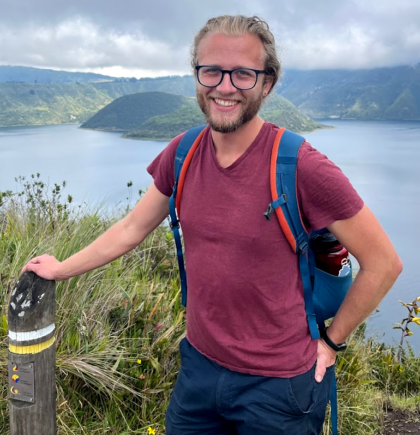All about our new Intern Minister.
From Mac:
“I grew up in a small town in Central Massachusetts, with two older siblings, plenty of access to the woods, and a small variety of farm animals. That is also roughly the order of importance. My family is close, and my siblings especially helped raise me into someone who was fiercely curious about the world and tenacious in loving others. Being outdoors and knowing the world around me is when I felt most alive and at home. And as the youngest kid I felt somewhat of a peer to the sheep and chickens and goats, collaborators in what it meant to grow up.
I was also raised UU, in a church that was tightly knit but fairly insular. I never particularly had a sense of being part of a larger Unitarian Universalist faith, but I was very close to my friends in youth group. I looked up to my parents’ church friends, and I particularly enjoyed the process of being UU — exploring questions and finding answers and gathering in community while we did so. When I graduated high school and went on to college, I had a natural break with Unitarian Universalism. I didn’t stop being UU, but I did stop going to church. I was now hundreds of miles from the community where I was raised, and I simply never sought out a replacement for my childhood church. Unitarian Universalism felt like an important part of how I grew up, but not like something that I needed to seek out and bring into my adult life.
The thing that eventually drew me back into Unitarian Universalism was the service industry. In college, I worked at a late-night sandwich shop, and was close enough to my regulars that I ended up being roommates with one of them. After college, I worked as a barista, and was blown away by how lifegiving it was for me to be a community resource in this particular way, making people’s lives better through accompaniment. This was the critical moment in my decision to apply to divinity school: Wanting to dive into what it can mean to be part of a community, and how you can be a catalyst of communal life.
In divinity school, one of the communities I got to be a part of was the other UUs who were pursuing ordination. This was the first time I had been part of a UU community broader than the specific church I grew up in, and my friends were able to help me articulate both the things that felt vital about our religion and the questions that felt vital to solve. For me, right now, what feels powerful about being UU is being part of a community dedicated to the ideas of inherent worth and collective liberation. Some of the questions I’m interested in working through are how to better serve UUs who aren’t part of congregational life; how to more consistently pursue our covenants; and how to cultivate a Unitarian Universalism which is more relational and less individualistic.”

